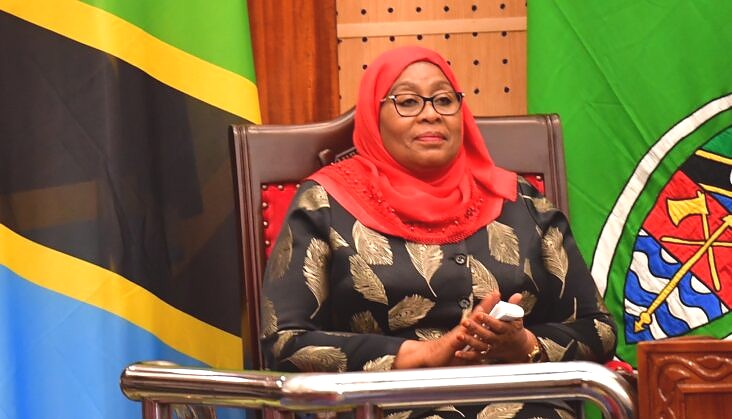President Samia Suluhu Hassan has reassured the country of her commitment of building a competitive economy and improving the living standards of the people. She said, during her tenure in the office, she would love to see Tanzania trading and working with other nations as well as ensuring peace and stability of the country. President Samia made the statement during an interview with BBC Swahili programme, where she also expressed her experience, since she was promoted to the country's top position from Vice-Presidency in March this year.
"I want to see the development of Tanzanians... I'm trying to build a coordinated government, so that you can work for the people and for the development of the country," she said. Since she was sworn in as the sixth President of Tanzania, Ms. Samia has already taken a number of initiatives as well as issuing bold directives aimed at building the country's economy and improving the living standards of Tanzanians.
To begin with, President Samia had in April this year demanded sweeping reforms in the investment sector, as part of her government's grand plan to restore trust of investors in the country. In her directives, she ordered the investment docket under the Prime Minister's Office to immediately establish a One Stop Centre in a bid to stamp out bureaucracy in issuance of services. She also insisted that there was no need for investors to hustle around various institutions to secure business certificates and permits.
The President also expressed her concerns over the issuance of work permits, saying there is a bureaucracy that was discouraging and chasing investors away. Available statistics show that Tanzania Investment Centre (TIC) has registered 93 big investment projects worth 1,6 billion US Dollars (about 3,6tri/-) between March and June this year. This represents a 36,7 percent rise in investment projects in comparison to the corresponding period last year, when a total of 68 projects, worth 321 million US Dollars (738bn/-) were registered.
The newly-registered investments are expected to create 17,670 jobs to Tanzanians as compared to 5,000 jobs created during the same period last year. Apart from political will, the sixth-phase Government has been walking the talk by ensuring that results occur positively. Equally, the Head of State demanded creativity and hard work from Regional Commissioners (RCs) and Regional Administrative Secretaries (RASs), for the country to attain development and economic growth it envisions.
She said they should also be the champions of the industrialisation drive being implemented by the Government with the aim of boosting the national economy, creating employment and value addition to the raw materials being produced in the country. In another development, President Samia told the BBC that there were people who didn't have faith with the country having a female president; however she was reassured to keep working hard for the interest of the country.
"Typical of African cultures... Some of them, yes, they don't believe. And it's not only in Africa, you remember what happened in America when Madam Clinton (Hilary Clinton) was contesting, it reached a point where we thought she was going to be a President of America but she couldn't," she noted. Speaking on the people's perception of female presidents, she said Africa is now showing the way as the continent has happened to have women Heads of State.
Some of African countries that have been led by female Presidents include Slyvie Kiningi of Burundi (February - October 1993) Ameenah Gurib-Fakim of Mauritius (June 2015 - March 2018) and Catherine Samba of Central African Republic (January 2014 - March 2016).
Others are Joyce Banda Malawi (April 2012 - May 2014), Agnes Bellepeau of Mauritius (March - July 2012 and May - June 2015) Rose Rogombe of Gabon (June 2009 - October 2009) and Ellen Johnson of Liberia (January 2006 - January 2018). The list also has Ivy Matsepe-Cassaburi, Acting President of South Africa (September 2005), Ethiopia's Sahle-Work Zewde from October 2018 to date and the current Tanzania head of State, President Samia.
"But there are people who don't believe that women can be better presidents and the only way to prove them wrong is through implementing development plans and seeing what you are doing for them. They will come to terms, definitely," she explained. Sharing her experience of being the President, Ms. Samia described the job as difficult and easier at the same time. According to her, when the Government is correctly coordinated then it is much easier to operate, and when it is fragmented then it becomes difficult, however she assured to continue building a synchronized administration.
